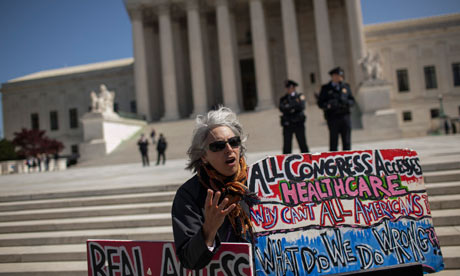
There is something surreal, absurd even, about the US supreme court's recent three-day hearings on President Obama's healthcare law. In essence, nine people, all appointed by presidents of the United States and not elected by nor accountable to the American people, will have the power, come June, to determine whether the president's landmark 2010 legislation will stand as is, be ruled unconstitutional and done away with entirely, or be ruled unconstitutional in part and so be hobbled and in doubt.
It is surreal and absurd that we are even having this conversation again, given that the crux of the matter is that 50 million Americans do not have health insurance. Wasn't the point to make sure the richest and most powerful nation on the planet could protect its own people, as other nations do, including Canada, our neighbor to the north?
But in the world of American politics, it seems anything can become a political football at any given moment, and in this presidential campaign cycle, healthcare coverage has re-emerged as a lightning-rod issue, and one that will force its way into the election debates regardless of how the supreme court rules. For sure, Mitt Romney, the presumptive Republican candidate, is chomping at the bit, his ever-changing political mind glossing over the fact that "Obamacare" is not only modeled after a law he guided through in Massachusetts when governor, but that both his and President Obama's healthcare teams were advised by Professor Jonathan Gruber, widely considered a leading expert on healthcare laws. Yet, when one aspires to the highest office in the land, selective amnesia seems to be the order of the day.
The root of the problem, so we hear, is this thing called the "individual mandate", the central provision of Obamacare that requires most Americans to obtain health insurance. In its courtroom arguments, the Obama administration says the purpose of the mandate is to crack down on "free riders" – uninsured people who go to the hospital and can't pay their bills, passing the cost of their care on to taxpayers and people with insurance.
Chief Justice John Roberts wondered aloud, however, why can't Americans satisfy the mandate with a policy that covers only very serious care? The current healthcare law offers much more progressive benefits, including services like maternity care, and it is argued that many will never need that. I suppose we are forgetting that half the American population are women and many of them do, in fact, have children.
The individual mandate's other grand scheme is to bring younger and healthier people into the system, offsetting the cost of requiring insurance companies to cover sick people. In that context, the policy is more geared to the needs of the insurance industry and market.
From what I have gleaned, losing the mandate would mean continuing with our unfair individual insurance markets in a world where many employers are no longer offering insurance. In other words, if the individual mandate portion of Obamacare is struck down, which is believed likely, given the routine 5-4 split of the supreme court along party lines (the majority of justices being Republican-appointed), the number of Americans insured would drop drastically. And only very ill people will choose to get insurance in the first place, thereby driving back up insurance prices. In that case, we will be right back at square one.
True, if the individual mandate is struck down, the healthcare law will still have about a dozen sections that, if funded, would significantly expand health coverage to many sectors of the American society. But most of those provisions will not take effect until 2014; if the supreme court rules as many believe it will, against the individual mandate, that could launch an all-out assault on the entire law, piece by piece, until it is entirely erased. The Republican party has pledged to repeal the Affordable Care Act.
And if the individual mandate is struck down, a more fundamental question would also arise: who will pay for these additional steps to cover the uninsured and create new and more affordable options for middle-class and working-class people?
Finally, what needs to be said is that this latest battle is really about politics, Republicans v Democrats. We saw this in 2010 with the nasty public debates about the Obama bill, where Americans cursed, screamed, and threatened each other, and while the insurance companies sat back and lobbied behind the scenes for what they wanted. Yes, Obamacare passed, but the major scars included many congressional members losing their seats in that year's midterm elections. The seeds were planted for the huge divide that rules in America in 2012.
As my friend Michael Cohen, a retired educator, has put it, certain politicians are so fixated on whether the US constitution is being violated or not that they seem to forget or ignore an equally important document upon which our constitution is founded – namely, the Declaration of Independence. We are guaranteed the inalienable rights of life, liberty, and the pursuit of happiness.
If life is an unalienable right, then shouldn't we have a healthcare system that protects all citizens from life-depriving illness?

